Yunomichan
Yunomichan Japanese Name: ゆのみちゃん
Literal Translation: Little Teacup¹
Released: February 2002
Original Japanese: WWW  PDF PDF
This heartwarming character makes delicious tea for you. Please pause to take a hot sip from Yunomichan.
おいしいお茶を入れてくれる心あたたまるキャラクター。ゆのみちゃんでホットひといきついてください。
Characters
 |
 |
 |
 | Yunomichan
Little Teacup¹ | Matcha
Green Tea² | Genmaicha
Brown Rice Tea³ | Houjicha
Pan Roasted Tea4 |
 |
 |
 | Sakuramochi
Cherry Blossom Rice Cake5 | Imokintsuba
Potato Fudge6 | Konpeitou
Sugar Candy7 |
 |
 | Jasminechan
Little Jasmine Tea
| Kouchakun
Little Black Tea
|
Images
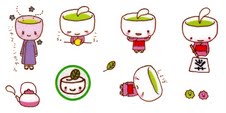 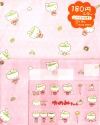 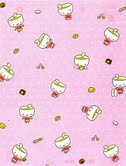 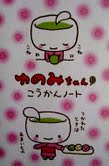 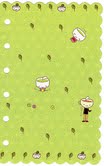 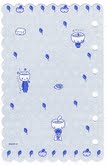 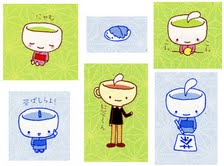
Translation Notes
- Yunomi (湯呑み or ゆのみ, literally: cup for a hot drink) are the handle-less teacups, typically made from a ceramic material, being taller than wide, with a trimmed or turned foot. Unlike the more formal chawan (茶碗) tea bowl which is used during the Japanese tea ceremony, the yunomi is made for daily (or informal) tea drinking. Wikipedia: Yunomi, Wikipedia: Chawan
- Matcha (抹茶) refers to finely-milled green tea. The cultural activity called the Japanese tea ceremony centers on the preparation, serving, and drinking of matcha. In modern times, matcha has also come to be used to flavour and dye foods such as mochi and soba noodles, green tea ice cream and a variety of wagashi (Japanese confectionery). Wikipedia: Matcha
- Genmaicha (玄米茶, "brown rice tea") is the Japanese name for green tea combined with roasted brown rice. It is sometimes referred to colloquially as "popcorn tea" because a few grains of the rice pop during the roasting process and resemble popcorn. This type of tea was originally drunk by poor Japanese, as the rice served as a filler and reduced the price of the tea; which is why it is also known as the "people's tea". Today it is consumed by all segments of society. Tea steeped from these tea leaves has a light yellow hue. Wikipedia: Genmaicha
- Houjicha (ほうじ茶 or 焙じ茶) is set apart from other Japanese green teas because it is roasted in a porcelain pot over charcoal. The tea is fired at high temperature, altering the leaf color tints from green to reddish-brown. Wikipedia: Hojicha
- Sakuramochi (桜餅) is a variety of wagashi, or Japanese confectionery consisting of a sweet pink mochi (rice cake) and red bean paste, covered with a leaf of sakura (cherry blossom). Wikipedia: Sakuramochi
- Imo kintsuba (芋金鍔 or いもきんつば) is a type of kintsuba made of sweet potato. Kintsuba is a traditional Japanese confectionery that consists of anko (sweet bean paste), coated with a thin layer of flour, and typically molded into squares. There are different variations of kintsuba such as imo kintsuba (sweet potato kintsuba) or kuri kintsuba (chestnut kintsuba). Wikipedia: きんつば
- Konpeitou (金平糖, 金米糖, or 金餅糖 or こんぺいとう, コンペイトー) is a Japanese hard candy originally made in Portugal. The word "konpeitou" comes from the Portuguese word confeito, which means a sugar candy. It was introduced to Japan somewhere around the 15th and 16th century by traders from Europe. Wikipedia: Konpeito
|


















No comments:
Post a Comment